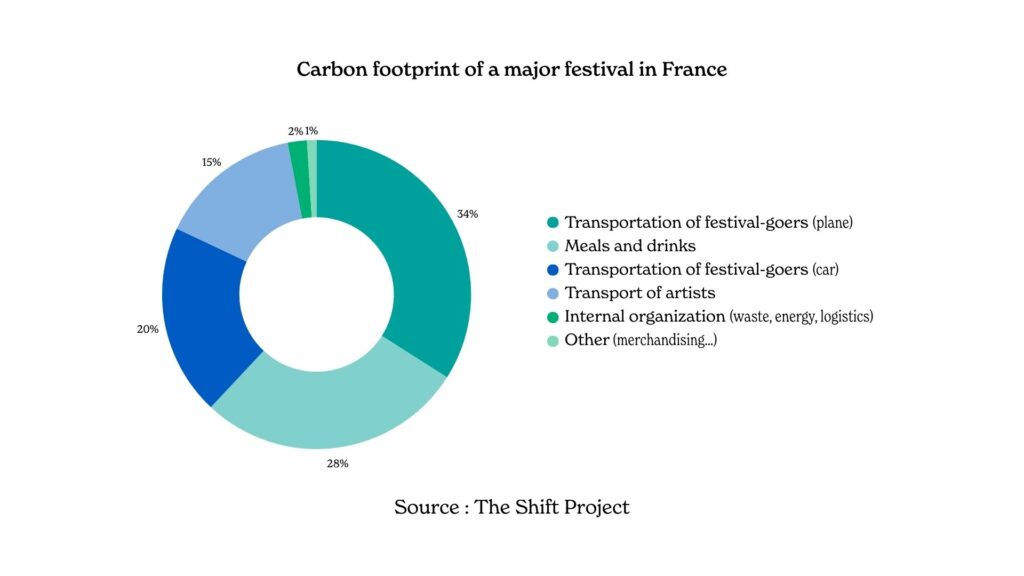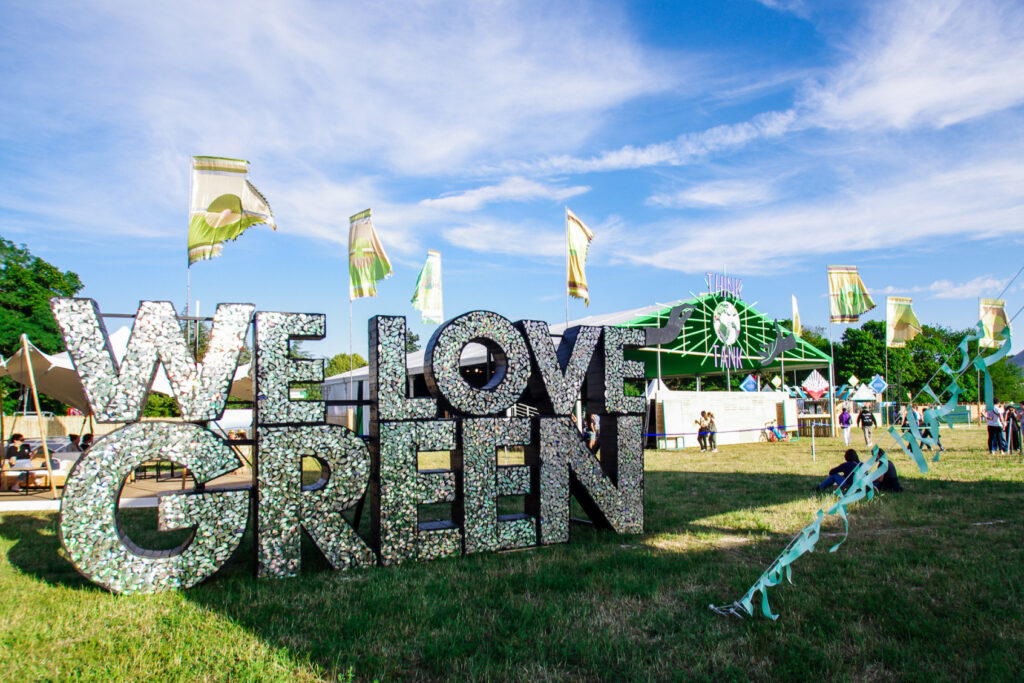Music may soothe the soul — but what’s its impact on the planet? Like any other industry, music carries a significant carbon footprint. From recording studios and concert venues to physical media production and streaming platforms, every part of the ecosystem contributes to greenhouse gas emissions.
This article explores the environmental impact of the music industry and highlights the innovative solutions emerging to help turn this vital cultural sector into a model of sustainability.
Table des matières
The carbon footprint of the music industry 🎵
In the UK alone, the music industry is estimated to generate over 400,000 tons of greenhouse gas emissions each year. Festivals are especially high-impact events, combining several sources of pollution: large amounts of non-recyclable waste, extensive plastic use, and heavy logistics tied to the travel of audiences, artists, and crews.

Concerts and tours are by far the biggest contributors to the music industry’s carbon footprint. A single international tour by a major artist can generate several thousand tons of CO₂, primarily due to:
✈️ Transportation for artists and audiences
🚗 Food and beverage consumption
🔌 Energy use for lighting, sound, and staging
🗑️ Waste generated on-site
The music industry’s bold sustainability initiatives 🌱
Festivals
With growing awareness around climate issues, the music industry is seeing more and more initiatives aimed at reducing its environmental footprint — and festivals are leading the charge.
As temporary events that gather thousands of people in one place, festivals concentrate many major sources of emissions. It’s no surprise they’ve become testing grounds for more sustainable models. Soft mobility, eco-friendly stage design, local food sourcing, better waste sorting, and renewable energy use — many organizers are now rethinking their practices to shrink their footprint without compromising the artistic experience.
In France, We Love Green is often cited as a model for sustainable music events. Powered 100% by renewable energy — including solar panels and generators running on recycled vegetable oil — the festival also implements best-in-class waste management, with up to 85% of waste sorted and recovered.
On the food side, the commitment is just as strong: every food stand offers organic, local, and seasonal options, with special attention paid to minimizing the carbon impact of the menus.

Artists
More and more artists are using their platform to champion environmental causes and raise awareness among their fans. And it’s no longer just about a few messages on stage or social media posts — some are taking real action: cutting down on air travel, using eco-responsible stage designs, or offsetting the emissions from their tours.
By changing their professional habits, they’re proving that even in the high-demand world of live performance, sustainable choices are possible.
Billie Eilish is a standout example. For her Happier Than Ever world tour, she launched several green initiatives: banning plastic straws, installing free water refill stations, selling eco-designed merch, and more. She’s even gone a step further by creating “eco villages” outside her concert venues — interactive spaces to engage audiences on climate issues. It’s a bold way to show that music and environmental commitment can go hand in hand.

Labels
Record companies are also beginning to take environmental concerns seriously. From cutting waste and using eco-friendly packaging to offsetting carbon emissions and implementing internal sustainability policies, initiatives are picking up speed — often driven by pressure from artists, fans, and institutions.
British label Ninja Tune is considered a pioneer in the space. It has adopted plastic-free packaging for its vinyl releases and offsets all of its carbon emissions. This voluntary approach shows that musical creativity and ecological responsibility can absolutely coexist.

Industry best practices to remember 👍
As you’ve seen, many players in the music industry — from festivals to artists to record labels — are testing real solutions to reduce their environmental footprint. While the approaches vary depending on context and resources, there’s growing consensus around a set of proven practices that can serve as benchmarks for building a more sustainable sector.
Here’s a snapshot of effective, easy-to-adopt initiatives already in place:
🚲 Soft mobility
Free shuttles from train stations
Carpooling incentives (priority parking, discounted tickets)
On-site bike amenities and secure parking
Carbon offsetting for travel-related emissions
🌞 Clean energy
Hybrid or biofuel-powered generators
Temporary solar power setups
Energy-efficient LED lighting
Stages partially powered by renewables
♻️ Resource optimization
Clear and mandatory waste sorting systems
Reusable, returnable cups
Ban on single-use plastics
Composting for organic waste
A collective shift with Music x Climate
As more on-the-ground actions emerge, global initiatives are beginning to shape the ecological transition of the music industry. One example is Music x Climate, an international project that lays the foundation for large-scale change.
Launched by Spin Ventures and managed by The House of Circularity, Music x Climate aims to transform the music industry by reducing its carbon footprint and integrating sustainable business models. This collaborative initiative brings together labels, artists, event organizers, and innovators to identify and implement real solutions — from optimizing logistics and using bio-based materials for merchandise to adopting renewable energy for concerts and festivals.
We’re proud to be one of the initiative’s key partners. Our technology plays a central role by enabling real-time carbon footprint tracking, monitoring progress, and identifying actionable levers. The goal: to accelerate the transition toward more responsible practices by combining innovation with the principles of a circular economy.
In bref
The music industry is at a pivotal moment in the face of growing environmental challenges. While its carbon footprint is significant, the wave of innovative initiatives shows that deep transformation is not only possible — it’s already underway. From concerts powered by renewable energy to zero-waste festivals, and from committed artists to labels rethinking their business models, the industry is developing creative solutions that could inspire change far beyond its own walls.
Music has always had the power to bring people together and spark emotion. Today, it also has the power to lead the way toward a more sustainable and regenerative cultural economy. By reimagining how we produce, distribute, and consume music, we can help protect both our cultural legacy and the planet that makes it all possible.
Meet an expert to discover the solution










